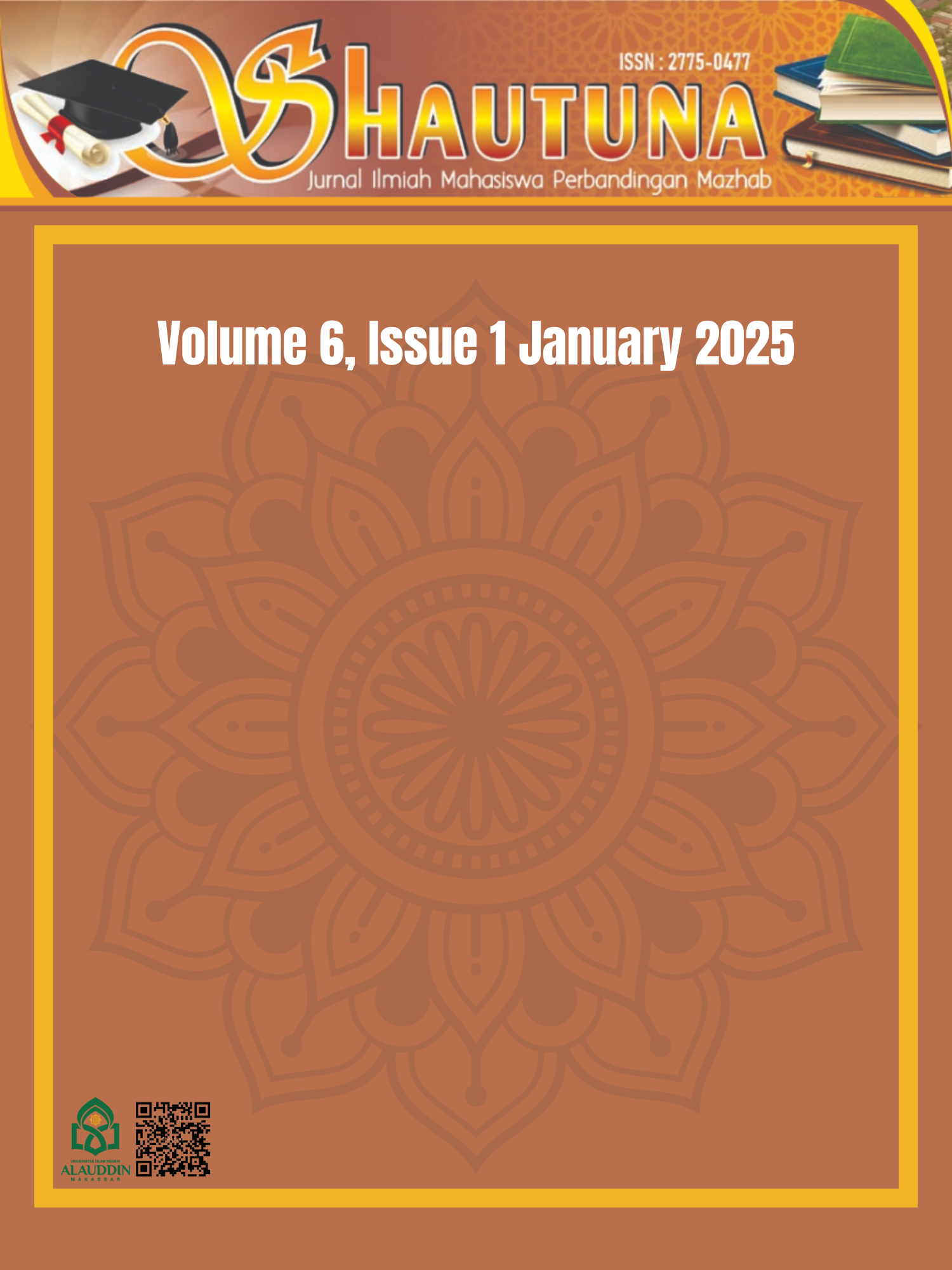Integration of Fiqh al-Bi'ah and Indigenous Environmental Practices
A Study of the Pa'jukukang Tradition in Bantaeng Regency
DOI:
https://doi.org/10.24252/shautuna.v6i1.55037Keywords:
Fiqh al-Bi'ah, Indigenous Environmental, Pa'jukukang TraditionAbstract
This study aims to conduct a critical study of the pa'jukukang tradition in the traditional rituals of the Bugis-Makassar community from the perspective of environmental fiqh, focusing on the identification of the ecological impact caused and the relevance of Islamic sharia values in regulating human relations with nature. This research is a field study with a qualitative approach, using descriptive-analytical methods and sharia approaches to examine in depth the Islamic values contained in these cultural practices. Data was obtained through participatory observation, in-depth interviews, and documentation, then analyzed thematically. The results of the study show that the pa'jukukang tradition consists of four main stages: appasulu pangngajai, akkawaru, kalau'u ri pa'jukukang, angnganre ta'bala'na, and angnganre raja'na. The implementation of this tradition has an ambivalent impact on the environment: on the one hand, there are the values of preservation and respect for nature; But on the other hand, some technical practices have the potential to cause pollution or overexploitation of natural resources. From the perspective of environmental jurisprudence, the implementation of this tradition can be reviewed through the basic principles of Islamic ecological ethics, namely spirituality as the basis of ecological behavior; iḥtirām wa ḥiẓ al-bi'ah (respect and protection of the environment); istikhlāf wa al-amānah (Caliph and Trust); al-mīzān (balance); al-'adl wa al-iḥsān (justice and goodness); al-maṣlaḥah al-'āmmah (public good); lā tufsidū fī al-arḍ (prohibition of doing damage to the earth); and the principle of sustainability. Therefore, it is necessary to mainstream environmental jurisprudence in the implementation and preservation of the pa'jukukang tradition as a form of harmonization between local cultural values and Islamic teachings in maintaining environmental sustainability.
References
Bella, Ariska. “Pembukaan Lahan Perkebunan Menurut Undang-Undang Nomor 32 Tahun 2009 Tentang Perlindungan Dan Pengelolaan Lingkungan Hidup Perspektif Fiqh Siyasah.” UIN Raden Intan Lampung, 2020.
Enhas, Muhammad Iqbal Ghifari, Alfan Nawaziru Zahara, and Basri Basri. “Sejarah, Transformasi, Dan Adaptasi Lembaga Pendidikan Islam Di Indonesia.” Intelektual: Jurnal Pendidikan Dan Studi Keislaman 13, no. 3 (2023): 289–310. https://doi.org/10.33367/ji.v13i3.4457.
Ferawati, Ferawati. “Nilai-Nilai Ritual Bakar Kemenyan Dalam Upacara Mappanre Tamma Di Kelurahan Pacongang Kabupaten Pinrang (Perspektif Ajaran Islam).” IAIN Parepare, 2021.
Hasanah, Uswatun, Lukman Nul Hakim, and Kamaruddin Kamaruddin. “Tradisi Pembacaan Al-Qur’an Surah Al-Waqi’ah, Yasin Dan Al-Kahfi (Studi Living Qur’an Di Pondok Pesantren Sabilul Muhtadin Desa Langkan Kecamatan Banyuasin III Kabupaten Banyuasin).” Ta’wiluna: Jurnal Ilmu Al-Qur’an, Tafsir Dan Pemikiran Islam 3, no. 1 (2022): 29–44. https://doi.org/10.58401/takwiluna.v3i1.544.
Indrajati, Sujono, Emawati Emawati, and Muh Azkar. “Aktualisasi Pendidikan Fikih Lingkungan (Fiqh Al-Bi’ah) Pada Masyarakat Kawasan Hutan Desa Genggelang Kecamatan Gangga Kab. Lombok Utara.” MANAZHIM: Jurnal Manajemen Dan Ilmu Pendidikan 5, no. 2 (2023): 644–66. https://doi.org/10.36088/manazhim.v5i2.3323.
Librianti, Eka Octalia Indah, and M Alqautsar Pratama. “Transformasi Tradisi Lisan Sebagai Sarana Dakwah: Kajian Historis Dan Tantangan Era Digital.” Journal of Community Development 1, no. 1 (2022): 46–63. https://journal.nabest.id/index.php/jcd/article/view/29.
Maabi, Husnul, Abdul Halim Talli, and Andi Muhammad Akmal. “Tradisi Pa’jukukang Perspektif Al ‘Urf.” Qadauna: Jurnal Ilmiah Mahasiswa Hukum Keluarga Islam 5, no. 3 (2024): 524–41. https://doi.org/10.24252/qadauna.v5i3.45034.
Madjid, Sry Ayu B. “Etnografi Komunikasi Tradisi Pesta Adat Pa’jukukang-Gantarangkeke Di Kabupaten Bantaeng.” Universitas Hasanuddin, 2022.
Mustamir, Ahmad Khoirul. “Islam Nusantara: Strategi Perjuangan Keumatan Nahdlatul Ulama.” Intelektual: Jurnal Pendidikan Dan Studi Keislaman 9, no. 3 (2019): 297–310. https://doi.org/10.33367/ji.v9i3.1028.
Nashihin, Nashihin, and Muhyidin Muhyidin. “Studi Islam Dalam Pendekatan Sosiologi.” JOSH: Journal of Sharia 2, no. 01 (2023): 33–43. https://ejournal.insud.ac.id/index.php/josh/article/view/175.
Nasir, Mohamad Abdun. “Revisiting the Javanese Muslim Slametan: Islam, Local Tradition, Honor and Symbolic Communication.” Al-Jami’ah: Journal of Islamic Studies 57, no. 2 (2019): 329–58. https://doi.org/10.14421/ajis.2019.572.329-358.
Rizhan, Afrinald, and Ahmad Rozai Akbar. “Hukum Kelurga Islam Melayu Di Indonesia.” Jurnal Az Zawajir 5, no. 2 (2024): 72–84. https://doi.org/10.57113/jaz.v5i2.370.
Sudaryo, Achmad. “Dinamika Pendidikan Islam Di Indonesia.” INTERDISIPLIN: Journal of Qualitative and Quantitative Research 1, no. 1 (2024): 1–9. https://doi.org/10.61166/interdisiplin.v1i1.1.
Sugiarto, Muhammad. “Tradisi Pesta Adat Gantarangkeke Bagi Masyarakat Kecamatan Gantarangkeke Kabupaten Bantaeng.” Social Landscape Journal 3, no. 1 (2019): 1–19.
Wardani, Santi. “Tata Kelola Retribusi Persampahan Di Gampong Rukoh Kecamatan Syiah Kuala Kota Banda Aceh.” UIN Ar-Raniry Banda Aceh, 2023.
Widayuni, Rifqy. “Partisipasi Masyarakat Dalam Pengembangan Desa Wisata Di Desa Sidokaton Kecamatan Gisting Kabupaten Tanggamus.” UIN Raden Intan Lampung, 2019.
Downloads
Published
How to Cite
Issue
Section
License
Copyright (c) 2025 Muhammad Tahir, M Thahir Maloko, Abdul Halim Talli

This work is licensed under a Creative Commons Attribution 4.0 International License.









